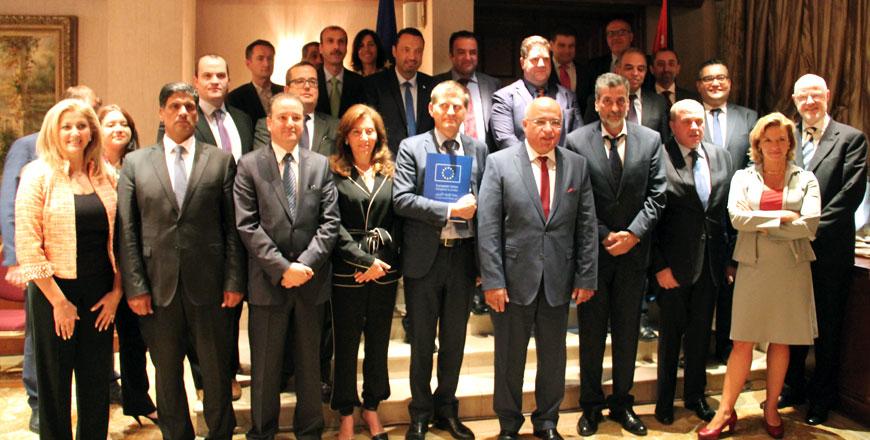You are here
Jordan on right track to democratic reform — officials
By Camille Dupire - Oct 10,2017 - Last updated at Oct 10,2017

Senior officials and EU representatives pose for a group photo at the King Hussein Club on Monday (Photo by Camille Dupire)
AMMAN — Representatives of the project “Enhanced Support to Democratic Governance in Jordan” (EU JDID), funded by the EU and the Kingdom of Spain, held on Monday its first coordination committee meeting to discuss the advancement of the programme since its inception, and the future plans for the 2017-2018 period.
Held at the King Hussein Club in Jabal Amman, the meeting saw the attendance of Minister of Political and Parliamentary Affairs Musa Maaytah, EU Ambassador to Jordan Andrea Matteo Fontana, First Deputy Speaker of the Lower House Khamees Attieh, Chairman of the Independent Election Commission (IEC) Khaled Kalaldeh, European Centre for Electoral Support (ECES) President Monica Frassoni and the Spanish Deputy Head of Mission Tomàs Lopez Vilariño.
In his opening speech, EU Ambassador Fontana, who is also the co-chair of the coordination committee, said: “This project carries a great importance for both Jordan and the EU, as it is the first of its kind comprehensive programme encompassing the main components of democracy: parliament, elections, political parties and civil society with a strong focus on women and youth.”
“We have shown our support to the Kingdom’s commitment to change by doubling our funding through this programme,” he continued.
“Jordan is currently at a crucial juncture and has shown its keenness towards reform, in line with His Majesty King Abdullah’s discussion paper,” the ambassador added, referring to the Monarch’s reiterated pledge to enhance the “three pillars of a vibrant Jordanian democracy: a gradual deepening of parliamentary government, under the umbrella of [the] constitutional monarchy, underpinned by active public participation”, in his fifth discussion paper.
The first coordination committee meeting came five months after the official launch of the programme in May 2017.
“Our goal is to ensure an enhanced synergy between all parties in this project, with a focus on coherence and coordination between each component,” Fontana stated.
Launched with the aim of “supporting Jordan’s reform process towards consolidation of deep democracy and to promote inclusiveness of policy and decision-making process”, the 17.7 million-euro programme is funded by the EU and the government of Spain, and implemented by a consortium led by the ECES and the Spanish Agency for International Development (AECID), according to an EU statement.
Monica Frassoni, president of ECES, noted the importance of cohesion between all parties involved in the reform process, highlighting the “novelty of the mechanisms implemented”.
“We all seek to support strengthening the democratic governance of Jordan, which is playing its role as a key contributor to regional peace, stability and security. Our assistance to and engagement in this country has advanced rapidly over the past few months and we intend to keep this pace,” she stressed.
The participants were briefed by Said Sanadiki, project director of EU JDID, on the advancements of the ECES-led consortium in the fields of structural coordination, the milestones achieved during the inception phase, in addition to the work plan for the 2017-2018 period.
The AECID representative, Mercedes Cornejo Bareas, outlined the achievements made in the support to civil society organisations’ (CSO) area, including the training and financial assistance to CSOs and the learning programme targeting youth-based CSOs.
IEC Chairman Khaled Kaladeh commended the support of the EU in helping Jordan implement the 2017 local elections, and voiced his optimism for future cooperation within the democratic governance programme.
“This programme, which gives a special focus to youth and women, is building on the successes we have achieved during the local elections, where 57 per cent of women who ran for candidacy won,” he stated.
For his part, Maaytah voiced his appreciation to the EU representatives and their support to the reform process in the Kingdom, in line with His Majesty’s vision.
Related Articles
AMMAN — Representatives of Jordan's main political entities and of the governmental project “Enhanced Support to Democratic Governance in Jo
AMMAN — On Tuesday, the Centre for Strategic Studies of the University of Jordan hosted a conference to present the main findings of a civil
AMMAN — The EU delegation in Jordan celebrated the achievements made as part of their recently-launched programme “Enhanced Support to Democ
















